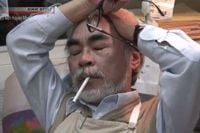In a striking turn of events, OpenAI has recently updated its ChatGPT technology to allow users to generate images in the beloved style of Studio Ghibli, a move that has sparked both excitement and controversy. This update, released earlier this week, has led to a viral trend where users are transforming their photos into Ghibli-style characters, reminiscent of classics like "Spirited Away" and "My Neighbor Totoro." While this new feature is being hailed by some as a democratization of animation, it has also raised significant copyright concerns.
Previously, OpenAI had refrained from enabling users to create prompts that mimic Studio Ghibli's art style to avoid potential copyright lawsuits. However, the latest update boasts an advanced capability to produce "precise, accurate, photorealistic outputs," which has undoubtedly caught the attention of many. Verified accounts on social media platforms, particularly X (formerly known as Twitter), have praised OpenAI for this innovation, calling it a breakthrough in making animation more accessible.
On March 26, 2025, OpenAI CEO Sam Altman joined in on the trend by changing his profile picture to an AI-generated image of himself styled as a Ghibli character. In a humorous post on his X account, he reflected on the journey of developing superintelligence, noting the mixed reception he has received over the years. He wrote, "> be me / > grind for a decade trying to help make superintelligence to cure cancer or whatever / > mostly no one cares for first 7.5 years, then for 2.5 years everyone hates you for everything / > wake up one day to hundreds of messages: ‘look I made you into a twink Ghibli style haha.'" This playful engagement from Altman highlights the cultural impact of the new feature.
Despite the lighthearted nature of the trend, the underlying issues surrounding copyright infringement cannot be overlooked. OpenAI is currently facing a barrage of lawsuits from various artists, musicians, and news publishers who claim that the AI's ability to generate content in established art styles undermines their intellectual property rights. The situation is further complicated by the fact that the White House has also participated in the trend, sharing Ghibli-styled images that some critics argue dehumanize individuals involved in serious legal matters, particularly in the context of immigration enforcement.
Hayao Miyazaki, the co-founder of Studio Ghibli, has long been an outspoken critic of AI-generated art. In a 2016 documentary titled "Never-Ending Man," Miyazaki expressed his disdain for AI technology, famously stating, "I would never wish to incorporate this technology into my work at all. I strongly feel that this is an insult to life itself." His sentiments resonate deeply with many artists who view AI as a threat to the authenticity and emotional depth that traditional animation embodies.
As the trend continues to gain traction, it is essential to recognize the incredible effort that goes into creating Ghibli films. For instance, a four-second clip from "The Wind Rises" took animator Eiji Yamamori an astounding 15 months to complete. This level of dedication stands in stark contrast to the instantaneous nature of AI-generated content, raising questions about the value of artistic labor in an age of automation.
OpenAI's new feature, powered by its latest GPT-4o model, allows users to create sophisticated Ghibli-style images by inputting detailed prompts. Initially intended to be available for free, the overwhelming demand has prompted OpenAI to limit access to paid users for now. The company has acknowledged the heavy strain on its resources, with Altman noting that ChatGPT's GPUs are "melting" under the pressure of generating these images. As a result, the company is implementing rate limits to manage the demand.
In response to concerns about copyright infringement, OpenAI has stated that it continues to prevent the generation of images in the style of individual living artists but allows broader studio styles. A spokesperson for the company emphasized that they aim to provide users with as much creative freedom as possible while learning from real-world feedback. This approach, however, has drawn criticism from artists who argue that it trivializes the hard work and creativity that go into traditional animation.
The debate surrounding AI and copyright is not limited to the realm of animation. OpenAI is actively lobbying the White House and U.S. Congress to incorporate the use of copyrighted material by AI companies into the fair use doctrine, which currently allows certain exceptions for search engines, satire, and memes. This lobbying effort reflects the growing tension between technological innovation and the protection of intellectual property rights.
As the Ghibli-style trend continues to unfold, it raises important questions about the future of art and technology. Will AI-generated content coexist with traditional methods, or will it ultimately overshadow the painstaking work of artists like Miyazaki and his team? For now, the conversation is far from over, and many are watching closely to see how Studio Ghibli will respond to this unprecedented situation.
In the meantime, the online community remains abuzz with Ghibli-inspired memes and images, showcasing the creative potential of AI while simultaneously igniting discussions about copyright, artistic integrity, and the future of animation. Whether this trend will lead to a greater appreciation of traditional artistry or further complicate the relationship between technology and creativity remains to be seen.

